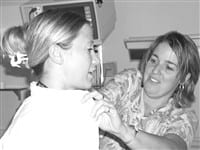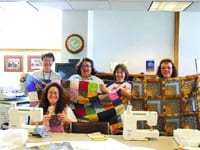The Next Generation Summer Program Gives Students An Up-close Look At Medical Careers
Hospital administrators say that to attract the next generation of health care workers, they have to start young.
In that sense, the Summer Medicine Program sponsored by the National Youth Leadership Forum (NYLF) could be a positive step.
Mercy Medical Center was one of many Massachusetts hospitals participating in the annual program, which introduces high school students to health professions through a series of workshops and hands-on experiences in medical facilities.
Mercy’s contingent of 21 students hailed from seven different states, from Maine to California, and hospital staff attempted to provide an equally wide-ranging series of presentations, from nuclear imaging to intensive care. During the day, the high school juniors and seniors heard about medical careers from doctors and nurses, handled medical equipment, and even talked to a patient or two.
To the hospital, it was time well spent. At a time when health facilities across the Commonwealth are struggling with staffing shortages, the Summer Medicine Program can be a strong showcase of what Massachusetts hospitals have to offer teenagers who are still juggling college options and career directions.
“We’re experiencing a shortage of health care people,” Susan Fenelon-Kerr, Mercy’s Community Relations director, told the students at the start of the day. “As many of us get closer to retirement, we’re excited to see how early you’ve become interested in health care professions.”
A Taste for Medicine
Indeed, the thousands of students participating in the nationwide program have expressed an interest in entering the field of medicine as doctors, nurses, or in some other capacity, and all are committed students, boasting grade-point averages of 3.4 or higher.
The juniors and seniors at Mercy were part of a larger group of 360 students spending 10 days at Babson College in Wellesley and visiting medical sites around New England. On this late-July day, the students split up and visited more than 20 hospitals. On other days, they visited medical schools, research labs, and other facilities, balancing those outings with daily class work, evening seminars, and a few afternoons of tourism.
Renee Dion, a conference assistant with the NYLF, said the visits to medical facilities are the educational highlight of the program because they give students something that can’t be recreated in the classroom.
“It’s a great opportunity for them to see what goes on here,” Dion said. “They get to experience it firsthand.”
“They’re right on the forefront of health care,” Kerr agreed, “and that’s a rare opportunity at this point in their lives.”
After beginning the day with a few words from hospital President Vincent J. McCorkle and some other health care workers, they split up into groups to visit — and learn about — individual areas of the Sisters of Providence Health System, from the hospital ICU and MRI areas to the Family Life Center for Maternity and Weldon Rehabilitation Hospital.
For instance, Intensive Care nurse Kathy Hutchins not only talked about the technical aspects of her profession but also discussed how the physical layouts of ICUs have changed over the years, with many hospitals leaning toward more open spaces with all patients visible. Because patient privacy can suffer in such an atmosphere, she added, glassed areas with curtains have also become commonplace.
In addition to the various small-group tours, two students shadowed Dr. Winthrop Whitcomb, who heads the Mercy Internal Medicine Service, in which a growing breed of physicians known as ‘hospitalists’ see hospital patients exclusively.
Attitude Adjustment
As Whitcomb spoke with all the students at the start of the day, he painted a picture of medicine as a challenging but ultimately rewarding career — as long as it is approached with the right attitude.
“There are few other fields in which you can go to work every day knowing you will make a difference for someone in need,” he said.
“In our field of medicine, someone needs you every single day, and I’ve found that the more you give, the more you will get.”
Whitcomb acknowledged that factors from staffing crunches to the rising cost of drugs and new technology have contributed to an “embattled” feeling in the profession, particularly in Massachusetts.
That’s why health care professionals must get in touch with the human side of their profession — and that emphasis must begin in school, he continued.
For example, instead of loading up with courses in chemistry, physics, and calculus as freshmen, Whitcomb suggested the students immerse themselves equally in the humanities — history, literature, economics, government, and religion, for example — knowing that medicine is, more than anything, a human experience.
“We feel, every day when we wake up in the morning, that we’re going to make a difference in the world,” McCorkle said during his speech. “Every single day, we help people at some of the most vulnerable points in their lives, when they feel out of control, helpless, sometimes hopeless — and we bring them hope and healing.”
Judging by the current staffing problems, Massachusetts hospitals certainly need more young people to catch that desire. Time will tell whether the Summer Medicine Program makes a difference.


